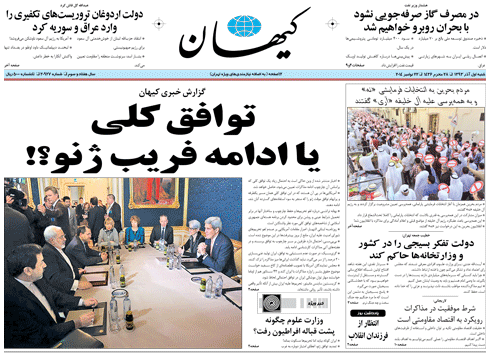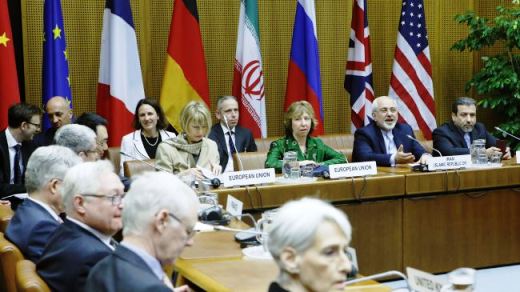The editorialist of Kayhan argues that imposition of unfair sanctions against Iran was not simply because of Iran’s nuclear program – rather those sanctions were rooted in the hegemonic nature of the US administration and the revolutionary nature of our country.
On the campaign trail when candidate Rouhani raised hopes by promising that sanctions would be lifted, seasoned individuals knew that those simplistic pledges would lead nowhere. They also knew that the victory of Hassan Rouhani in presidential elections would result in no changes in America’s policies to favor Iran’s interests.
Without naming names, the editorialist recalls the early months of Rouhani’s presidency and says, “Back then, simply by virtue of opposition [to the olive-branch approach of President Rouhani and his colleagues] you would be accused as benefitting from continued sanctions.” But more than one year on, the pessimistic can easily see that those statements were anything but the truth!
Hossein Shamsian, the editorialist who seems to have little hope of talks between Iran and P5+1 producing a deal in Vienna, or even at a later stage – In fact, he seems to have been pessimistic about a solution to the dispute in the first place – says what candidate Rouhani said on the campaign trail was different from what actually happened. The president had said, “The wheels of people’s lives should spin, so should the centrifuges.” The solution to the nuclear issue lies in direct talks with the headman [a reference to the US], he argues.
Thanks to gray areas in the Geneva Interim Agreement, which has been the basis of talks over the past year, scope of enrichment and not “removal of sanctions” has been given priority in the negotiations.

“Still, that is not all. Over the past year since the conclusion of the deal, despite all its shortcomings, the agreement has not been implemented equally by both sides. As the president has said by the admission of senior Western officials Tehran has acted in full compliance with its commitments, but P5+1, especially the US, have time and again ignored their commitments and taken new hostile measures against Iran such as imposition of sanctions and disruption to Iranian trade.”
The editorial goes on to say, “In these circumstances, now that we are at a sensitive juncture to secure a deal, a few points are worth mentioning about the Vienna talks:
1. America has implied, in the clearest language possible, that it is not trustworthy. How can one be clearer? President Obama signed an extension to Iran sanctions, and US senators sent a letter to President Obama calling on him to put Iran’s missile program on the agenda of the talks.
2. As talks continue and we keep making concessions, America’s international arms, that is to say the UN and the International Atomic Energy Agency, are pulling out all the stops in cooperating with the West. They are trying to set the stage, legally, for imposition of America’s will on the Iranian people. The biased and untruthful report of the UN nuclear agency which comes on the back of numerous inspections suggests that the IAEA is unable to comment on the nature of Iran’s nuclear program.
3. Some anti-national-interests behaviors and comments at home have prompted Americans to believe we need to strike a deal at any cost. Such an approach has simply given rise to the excessive demands of the enemy. They don’t even bother to pay attention to the approach of the Iranian government, the numerous concessions it has made and the broken taboos, the most glaring example of which is the American failure to grant visa to Iran’s choice as representative to the United Nations.
4. As Sirus Nasseri [a senior nuclear negotiator during the presidency of Reformist Mohammad Khatami] has said haste in drafting the agreement, like what happened in the first Geneva deal, is an experience that should not be repeated. Concerns that a hastily-drafted deal might not be legally compelling enough and thus be open to interpretation and abuse, are legitimate.
5. What people expected from so many comings and goings and several rounds of talks which involved the breaking of the taboo of holding talks with the Great Satan was not a few photos with the US secretary of state or a return of a few billion dollars of their own money. The most important thing that the president promised during his campaign and was reiterated later by himself and other officials was that unfair sanctions would be lifted. Frankly, if the sanctions are not terminated, we have achieved nothing.
